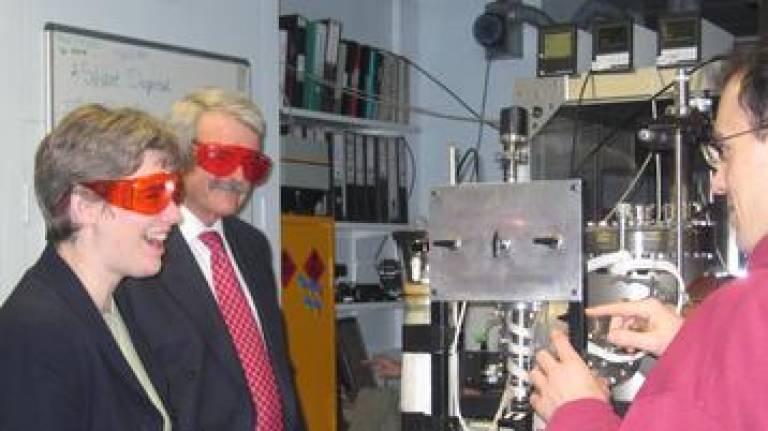Ruth Kelly visits UCL
8 December 2005
Secretary of State for Education, the Rt Hon Ruth Kelly MP, and Director General of Higher Education, Sir Alan Wilson, were shown around some of UCL's state-of-the-art research facilities on 7 December 2005 by UCL's President and Provost, Professor Malcolm Grant.

On only her second visit to a UK university since her Secretary of State appointment, Ms Kelly was welcomed to UCL by Professor Grant, Professor Michael Worton, Vice-Provost (Academic & International) and Professor Mike Spyer, Vice-Provost (Biomedicine).
Ms Kelly then visited the UCL Wolfson Institute of Biomedical Research, where Professor Ian Jacobs, Director of the UCL Elizabeth Garret Anderson Institute of Women's Health, explained how his ovarian cancer screening programme will depend upon the critical mass of research activity at UCL being in close proximity to the clinical centres of excellence such as UCL Hospital, and the essential roles played by the associated funding bodies. Professor Jacobs also demonstrated the opportunities that could be created by linking basic scientists, such as Professor Mike Waterfield, Director of the UCL Ludwig Institute of Cancer Research, with clinical academics, such as Professor Jacobs himself.
Professor Waterfield then gave the visitors a tour of UCL's cutting-edge proteomics laboratory, and demonstrated how analysis of the serum bank is leading to new markers for screening and diagnosis for a range of cancers and other diseases, while also emphasising the role of students in this work, and the key opportunities it provides for UCL's undergraduates and medical students.
Ms Kelly was met at the UCL Advanced Centre for Biochemical Engineering (ACBE) by its Director, Professor Mike Hoare, and Dr Chris Mason, who explained how the ACBE focuses on research and teaching to translate biomedical discoveries into the next generation of biopharmaceuticals. Professor Hoare emphasised how such activity is critically dependant on strong interdisciplinary collaborations with academic and industrial partners. A number of students from the centre presented their work on designing new vaccine therapies and tissue cell engineering to regenerate damaged corneas. The party also discovered how the ACBE is working with secondary schools to develop new teaching materials that connect the science curriculum with opportunities in the biopharmaceutical sector.
Professor Helen Fielding (UCL Chemistry) demonstrated experiments conducted with ultra-fast lasers by her molecular dynamics group, which are able to observe and control the fundamental motions that govern the whole of chemistry, biology and materials science. Ms Kelly commented: "I am delighted to have visited UCL, one of the leading research-intensive universities in the UK. It is exciting to see innovative, world-class research first hand."
Image: Ruth Kelly and Professor Grant visit the Molecular Dynamics Group
 Close
Close

